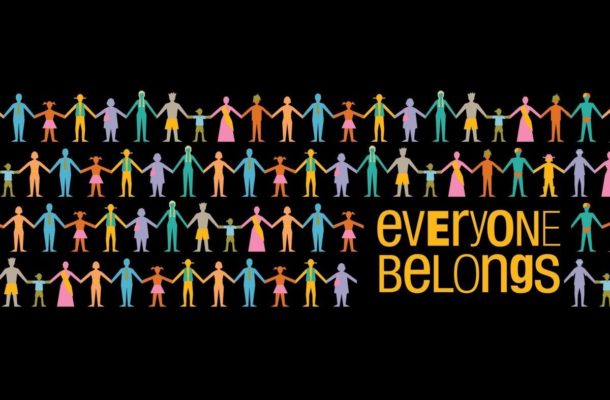Harmony Day – Everyday ways to reduce racial discrimination

It is very easy to be swayed by popular opinion and the flavour of the day in our media and public discourse topics – especially when high profile celebrities lend their influence or create a hashtag that stimulates awareness about a particular issue.
It is also very easy to become complacent when the latest ‘squeaky wheel’ topic pervades our consciousness and we may inadvertently find ourselves slipping back into old habits of unconscious bias, racial discrimination and very subtle forms of exclusion.
The Human Rights Commission tried to remind us of this process when it released the Everyday Racism and Bystander Action Community Service Announcements on 5 October 2017 with examples of what can happen when hailing a taxi or entering an elevator.
Interestingly, when these videos were distributed via social media, I noticed a range of very negative criticisms and people started complaining about other forms of ‘discrimination’ that they perceived in these announcements or they challenged the production values, rather than looking at these examples as a reminder of how ‘easy’ it can be to unconsciously discriminate.
I must admit, I was disappointed when I observed this behaviour – as I felt the message was being lost by the inherent nature of criticism that appears to be developing on social media. These videos, statistically speaking, have not been viewed as frequently as I would have expected given the gravitas of the publisher.
This result is also surprising because there has been a significant rise in the number of active social media users in Australia from 58% in 2015 to 69% of the population in 2018. Disappointingly, the number of people using social media for activism – supporting topical issues or events or contributing to public dialogue on them – has fallen from 39% to 19%.
If activists – or the public – are not interested in moving these important issues forward, then what other ways are there for us to consider sharing a positive message that encourages action that will ultimately reduce racism?
In my view, investigative journalism and insightful reporting or panel discussions have a role – not just in providing the public with the inside scoop on what is happening in our community and reporting on the news of the day, but also for providing some suggestions on ways forward in the future – not just a ‘call this number if this program has raised concerns for you.
When people’s emotions are aroused by the public discourse, they need to be able to either take action and help or be educated in some way with suggestions so that the story can enable productive outcomes rather than just more anxiety or depression.
Harmony Day is a reminder beacon for the ‘International Day for the Elimination of Racial Discrimination’ that is acknowledged on the 21st of March each year.
The 2018 theme is ‘Promoting tolerance, inclusion, unity and respect for diversity in the context of combating racial discrimination.’
So let’s look at some ways that we can do this on an everyday basis.
Tolerance – Australia’s Race Discrimination Commissioner, Dr Tim Soutphommasane has shared many reasons ‘Why we should speak out against racism and intolerance’.
He says that we should not be making excuses for the advocacy of discrimination and the expression of intolerance and that whilst he does not wish to stifle freedom of expression, he believes that people who engage in vilification or discrimination must not be protected from criticism. He also encourages us to hear from the people who suffer from racism (who are rarely heard). It is time to speak up.
Inclusion – Monash University has been very proactive at encouraging inclusion on campus by implementing an Equal Opportunity Policy, the Monash University Student Charter and the Monash University Ethics Statement.
These are formal processes designed to raise awareness that racism will not be tolerated. They have also joined forces with the Australian Human Rights Commission and some of Australia’s leading businesses, sporting bodies and NGOs to support the Racism – It Stops with Me campaign.
Unity – Unity in Diversity is an older term that has been widely used by various religious or faith based groups as a way of moving from identifying differences to encouraging understanding.
As a very multicultural country, Australia is uniquely placed to provide more opportunities for understanding, and not just from the view of different physical, cultural, linguistic, social, religious, political, ideological and/or psychological differences.
The Welcome Dinner Project is a perfect example of how you can bring people of diverse backgrounds together and facilitate understanding. On a different scale, the Taste of Harmony provides a food and culture sharing opportunity at work.
Respect for Diversity – whilst it may seem like an ‘avenue of last resort’ to regulate our society, we are fortunate that in Australia, the Fair Work Ombudsman helps people from diverse backgrounds understand their rights with a variety of freely accessible publications.
If we look back in time, we can see that when the law changed, indigenous Australians and women gained the right to vote.
Many of the advocates and champions of change go unrecognised and I would like to see more recognition for the people who have been prepared to stand up and wave the flag for others, quite often at great personal cost. The Diversity Council of Australia has made inroads in the workplace, but who is championing for the public who are not in the workplace?
As you contemplate these issues, I encourage you to find simple ways to reduce racial discrimination.
When you find yourself attaching labels or stereotypes to people from a particular background, acknowledge that awareness and ask yourself, how could I be more inclusive towards this person? What else could I do to help them understand what is happening and why? How could I educate them to understand the preferred ‘Australian Way’ to behave?
As a fourth generation Australian, I understand implicitly the concept of rights and responsibilities, courtesies and rules, etiquette and manners. It can be quite uncomfortable sometimes to stand up and suggest alternatives when I am in a mixed group of people, but if I want to both preserve the good parts of Australian life and empower future generations, I believe it is up to me to take personal responsibility every day, not just on Harmony Day. I encourage you to do your bit too…
Sue Ellson is the Founder and Director of Newcomers Network, a socially responsible enterprise providing information, events and advocacy for newcomers and networkers in Camberwell, Melbourne, Victoria. She has published three books and can be found via LinkedIn or at SueEllson.com.














